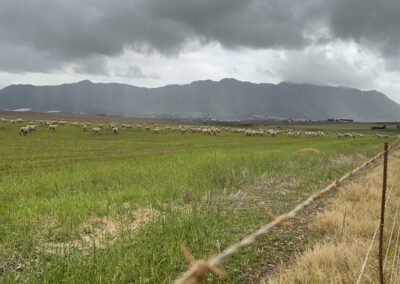Ambition and action
But the Paris Agreement has a ‘ratcheting up’ mechanism: climate plans are tested, discussed, and updated regularly. Recent alarming reports about climate change show that higher targets are necessary for all parties. The EU shifted from 40% to 55% and many nations did as well. If we together halve emissions by 2030, we can open the door that takes us to 1.5C as maximum temperature rise. Technically, it is entirely possible; financially as well.
For Climate Neutral Group, Carbon Specialist Jos Cozijnsen and Consultant Gabrielle Smith are attending the summit. They will regularly post insights and updates on LinkedIn. Jos will follow the Art 6 discussions, while Gabrielle investigates the ambition of the climate targets. They are planning to speak with Dutch delegates and politicians, companies, NGOs, and reporters.
We see these two weeks not only as the place where countries take the necessary decisions, but also as an inspiring PR momentum. It will be a showcase of innovative ambition and action. We believe that showing examples will breed decarbonisation.
High quality market mechanisms for carbon trade
One of the implementation measures out of the climate toolbox is international CO2 trade. We hope that COP26 will agree on proper rules so that the use contributes to the ambitions of Paris. It is the only chapter in the ‘Paris Rulebook’ about which there is still disagreement. This so-called Article 6 is on the top of the agenda – besides of course, the need for strengthened targets and meeting climate finance commitments for low- and middle-income countries.
International carbon trade can enable countries to achieve cost-effective CO2 emission reductions. In 85% of the Nationally Determined Contributions (NDCs), the interest in using Article 6 to deliver targets is mentioned. Studies show that global carbon trade doubles reductions at the same cost. And with global cooperation and using the carbon market all countries together can meet zero emissions in time.
So, for countries in helping to meet the CO2 targets or for large corporation with binding targets, Article 6 rules are needed. For example, that only one country reports the same credits, to avoid double counting.
The summit also needs to decide what to do with remaining old, Kyoto-era carbon credits (so called Clean Development Mechanism, CDM), as they do not bring down the global emissions needed under the Paris Agreement. They need to be partly cancelled or transitioned into the new more ambitious Sustainable Development Mechanism (SDM).
Growing role of the voluntary carbon market
Companies that have voluntary net-zero commitments can use the voluntary carbon market. For example, a Dutch insurance company with remaining emissions from commuter traffic or heating can compensate these by buying carbon credits from a CO2 reduction project on cookstoves in Ethiopia. These reductions also help the host country achieve its own NDC CO2 targets while the emissions of the Dutch insurer will remain in the Dutch report. Hence, in that case Art 6 is not being applicable.
Climate Neutral Group sees three key criteria for the voluntary carbon market to work properly:
- Putting a price on emitting carbon that motivates the emitter to reduce or stop the underlying emitting activity
- Financing an equivalent reduction elsewhere that would not have happened otherwise
- Using high quality standards for carbon projects will create a transparent, robust and reliable voluntary carbon market
We believe that the use of compensation should go hand-in-hand with strong reduction commitments to reach Absolute zero in 2050. An important requirement of our Climate Neutral Certified Standard, that was recently launched after we had officially been approved as Community Member of ISEAL, the global membership association for credible sustainability standards.
Jos Cozijnsen: ‘Our clients wish to make impact to the climate, by financing sustainable CO2 reduction projects for offsetting in addition to their own reduction strategy. With robust reporting they can also help countries that host these projects to meet their climate goals under the Paris Agreement: purpose and carbon market rules matter.”
Jos and Gabrielle will also attend meetings of ICROA, the International Carbon Reduction and Offsetting Alliance, from which Climate Neutral Group was one of the first members. After a year of intensive work in various ICROA working groups, we are committed to clear rules that will strengthen and accelerate the voluntary market. The aim is high quality compensation projects via CO2 reduction in low- and middle-income countries, combined with improving the living conditions of the local population and supporting their energy transition.
CNG facilitates corporate climate ambition
Climate Neutral Group supports companies to calculate and monitor the carbon footprint of their organisation. First, their own emissions such as energy, mobility, and business travel abroad. Second, the emissions from services and products in the complete supply chain.
We serve the Dutch government and international corporates, banks, (financial) service providers, insurance companies, main ports, food & beverage industry, and retail. We are also partnering closely with the aviation and travel sector, leisure as well as business travel, to get a grip on emissions, travel smarter, and make this sector and its clients more sustainable.
Our experience is that companies that choose for offsetting are also frontrunners in reducing carbon emissions. They have ambitious strategies on investing in reduction measures, employee involvement and the willingness to stand out from the crowd. We know how important it is for companies to strive for climate neutrality with our Gold Standard or VCS certified projects. They do not only reduce CO2 but also contribute to a better standard of living for the local population in the areas like health, employment and income, all important UN Sustainable Development Goals (SDGs).



